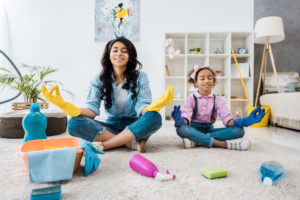Staying Calm 24/7 When You or Your Kids Have ADHD

What would it be like to enjoy an entire day of calm? What about enjoying this on a consistent basis? You can. Even if you have the most challenging children.
But let's make sure we define what calm is. Calm is not an absence of noise, problems or chaos around you. It means that no matter what is happening around you, you experience calm inside AND begin to spread that calm to those around you.
Instead of your environment changing you into a Crazy Mom or Freak Dad, YOU begin to change your environment. In order to achieve this, you don't need superhuman capabilities. This is for everyday Moms, Dads and kids. We must understand a few bedrock principles that will guide us to 24/7 Calm.
The Calm Creed
- I cannot control other people, how they behave or how they react.
- I cannot control situations and circumstances—most are beyond my control.
- When I react to people and circumstances, I surrender power over my emotions.
- I can only control one thing in life—my emotions, my actions, my reactions.
- No matter how my child behaves, I control myself. When I “lose it,” I lose my authority. I spread and create the calm I want.
Make a Conscious Choice to Remain Calm
- Realize that we cannot control our kids, nor should we want to. Our primary job as parents is to control ourselves and model proper behavior. How many of us throw adult tantrums when something goes wrong, then expect our children to remain calm? No matter what your child or spouse does, remain calm. Screaming or withdrawing emotionally only makes the situation worse. When we are calm, we can be fully engaged and solve problems instead of creating more of them.
Demonstrate Self-Respect
- We are not responsible for our children's behavior, attitudes and actions. If your child is in a bad mood, so be it. Choose not to give in to or join his pity party. If your child comes into the kitchen barking orders, you are not obligated to respond. Walk away calmly, go about your business and let your child know that when he's ready to be polite, you'll help him with breakfast. If your child refuses to do his homework, then he will suffer the consequences at school. Our children need to learn that they are responsible for their choices, and you are responsible for yours.
Assume a Calm Posture
- Each time you approach your child or spouse, ask yourself, “Do I want to have a conversation or a confrontation?” Instead of standing by and barking orders, sit down, put your feet up and relax. It is much harder to yell and lecture when you assume a calm posture. Kids are drawn to adults who sit—sitting says, “I am in control, everything is okay and I want to connect with you.”
Take Care of Yourself
- Exercise, walk your dog, pray, listen to music—do whatever helps you feel at peace. Make a decision that no matter what your child or spouse does, you are only responsible for your actions. This liberates parents and frees children to be responsible for their choices.
Be the Calm in the Storm
- The most effective way to calm an emotional child is for us to be calm. Instead of threatening an upset child, we need to draw the child into our calm. Sit down and begin to color with crayons or build with Legos. Play catch or do push-ups with your child. Invite him into your calm. This will freak him out at first, because he is used to seeing you get upset. What you are communicating, though, is (1) Your actions cannot control or manipulate me and (2) No matter how out of control you may feel, I am a rock you can count on.
You'll be surprised at how your children (and spouse!) begin to calm down once you do.

